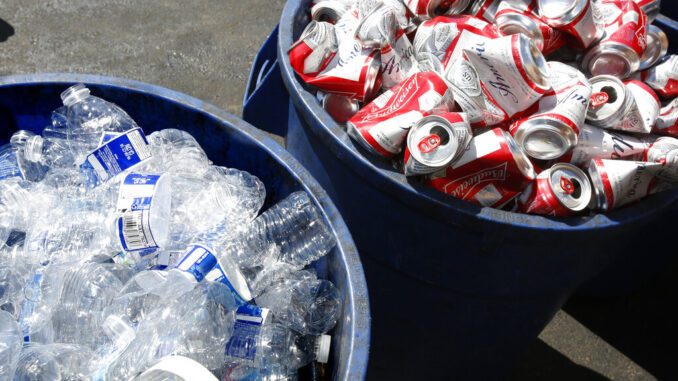
Almost everyone recognizes the symbol for recyclable items: three arrows, arranged in a triangle or circle, each arrow leading to the next. It shows the promise of recycling: That the items we discard today might be recycled into what we use tomorrow, reducing our waste and environmental footprints.
It sounds great, but it’s missing an arrow: The one that breaks the circle and leads to a landfill. Sadly, that arrow would show a path currently followed by most plastic products.
You may toss a used plastic bottle or food container into a blue bin at your home or office, thinking you’ve done a small part to help the planet. But the contents of that bin will eventually wind up in a sorting center, where machines and people will remove items that are deemed too contaminated or too difficult to recycle. Much of our plastic waste is hard to recycle using traditional methods (known as “mechanical” recycling), either due to a product’s chemical composition or its particular use.
In fact, about 90% of the plastic we currently use is not recycled. The item you tossed into a blue bin with good intentions may very well get recategorized and ticketed for a landfill anyway.
Any serious environmental policy platform must include attention to waste management, and that means focusing on recycling. Recycling has the potential to decrease the amount of trash that winds up in landfills (or worse, as litter in waterways, oceans and other ecosystems). Yet, America has struggled to adopt effective recycling programs for decades.
North Carolina’s General Assembly can change that by supporting existing legislation which promotes “advanced recycling.” The best part of this is that it can be done using an existing tax credit.
Advanced recycling uses new technology and chemical processes to break down plastic into its component substances. This is a more complete breakdown than mechanical recycling methods achieve, which allows for recycling a broader range of materials. The output is virgin-quality plastic, clean enough to create new products for use in food service, medical, pharmaceutical and other sensitive environments.
In addition to the obvious benefit of reducing the amount of waste that winds up in landfills or as litter, advanced recycling creates less demand for new plastic. That limits the use of natural resources in new manufacturing. Instead of plastic products following a linear model — starting with production and ending with a landfill — they can follow a circular model.
Over 500 companies have already committed to such a circular model as part of the Ellen MacArthur Foundation’s Global Commitment. These companies have pledged to make 100% of their packaging recyclable and include 25-50% of recyclable content in that packaging by 2025.
Reaching these goals — and ensuring that other organizations can answer the challenge with noble goals of their own — will require us to adopt better, more forward-thinking recycling programs, including advanced recycling. The best part of this is it is at no taxpayer cost and no appropriation or fiscal note. A facility may qualify for existing tax credit programs but would not expand the program or result in additional government funding. It’s also great to know the advanced recycling industry has invested over $7 billion in these facilities.
If we are serious about environmental stewardship, we must be serious about reusing more and throwing out less. By promoting advanced recycling, the General Assembly can move us closer to the optimistic ideal promised by those three simple arrows in the recycling symbol.
Retired state Rep. Curtis Blackwood (R) lives in Union County.
